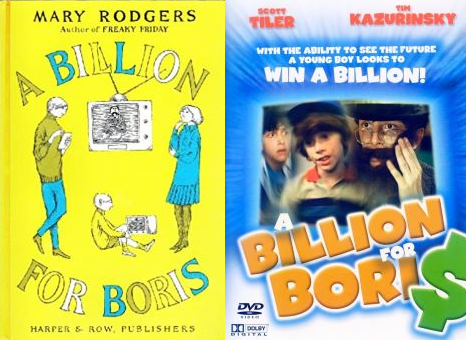If you’re only going to be remembered for one book, Freaky Friday is not the worst choice. However, Mary Rodgers actually wrote three books about the supernatural shenanigans of Annabel Andrews. (Also, she was the daughter of Richard Rodgers, as in “and Hart” and “and Hammerstein,” and she cowrote Once Upon a Mattress. So, you know, she had that going for her.) The other two are not as remembered as the first, but they don’t deserve to be as totally forgotten as they are.
The book, as with the original book of Freaky Friday, is told from Annabel’s perspective and is set in Manhattan. She is still vaguely involved with Boris, the Boy Upstairs—whose name is actually “Morris,” but he has adenoids and mispronounces things and she just kind of assumed. They aren’t quite yet dating, to Annabel’s frustration, but they are friends, and one day, to get her brother Ben—known as Ape-Face—to leave them alone, Boris gives Ape-Face an old TV that doesn’t work to take apart and put together. And when Ape-Face does, it shows the next day’s programming.
Annabel wants to use the powers of the Box, as they call it, to help people. Boris assumes—frankly on no evidence—that the future cannot be changed and instead decides to improve his life, and his mother’s, by winning quite a lot of money and overhauling their lives. The problem being that he’s still a teenager and doesn’t have a lot of options. Still, he manages to use Off-Track Betting and, while his mother is out of town, arranges to have the apartment painted and all the furniture replaced. Meanwhile, Annabel gives advance information to a reporter and squabbles with her best friend Virginia.
The two biggest differences between book and movie are that the book starts with Annabel (Mary Tanner Bailey) and Virginia (Marisa Johnston) wandering across Manhattan holding bouquets of balloons to the tune of a deeply misplaced song and that it inserts a brief and honestly unnecessary subplot wherein a couple of mob types notice Boris (Scott Tiler) and that he keeps winning and kidnap him. Other than that, they’re fairly similar, even to the point of using a lot of the book’s dialogue. Obviously it’s trimmed a lot—most of what’s gone is Virginia stuff and unnecessary—but very little is added.
Mary Tanner Bailey has gone on to quite a nice little career as a puppeteer—which I think probably pleased Mary Rodgers, who also did some puppetry work. Scott Tiler went on to be a major acting coach. And then there’s that kid playing Ape-Face. It’s a minor role, relatively speaking; some of his part has been trimmed as well. He may seem a little familiar. It’s his first movie role, though that same year he would be in The Hotel New Hampshire. I just now realized that, yeah, that is him in Pump Up the Volume in the ’90s. Also in the ’90s, he would appear as Scott Evil in the Austin Powers movies, and while he was uncredited in the movie of Buffy the Vampire Slayer, he would definitely go on to be credited on his forty episodes of the TV show.
Oh, another difference is a bit of a stinger at the end that is one of a handful of roles for Robert Earl Jones. He actually does something that Boris realizes he should have done. Currently, you get a video of Robert’s son James if you click on the page of the woman playing Stascha, Boris’s mother, as she’s played by Lee Grant. She’s a fun character, one of the few minor characters in this work that has her own inner life that seems worth getting into.
What I like, in fact, is that it’s made clear that neither Boris nor Stascha are fully right about their issues with one another. Oh, I’m not thrilled that she mentions his going to private school as something right in his life given one of the things he thinks is wrong in his life is that they’re two years behind in paying his tuition. But he does also get rid of her stuff because he thinks it’s for the best. I don’t believe that the truth is generally in the middle, but it sometimes is, and there’s definitely a happy medium between Boris and Stascha.
This movie isn’t as good as Freaky Friday. The book is fun—it’s written as a manuscript from Annabel determined to prove the existence of ESP to an institute studying the same, though I’d argue that a television that predicts the future is not the same as ESP. Still, the most interesting detail is the letter Annabel gets back from the institute. They ask for proof of her story, which is not unreasonable, and tell her that, if it isn’t true, she should send her manuscript to Ursula Nordstrom.
For next month, we’ll go to ’50s Ireland with Maeve Binchy, Minnie Driver, and Circle of Friends. As always, suggestions for future columns are welcomed, and so are contributions to my Patreon and Ko-fi!

